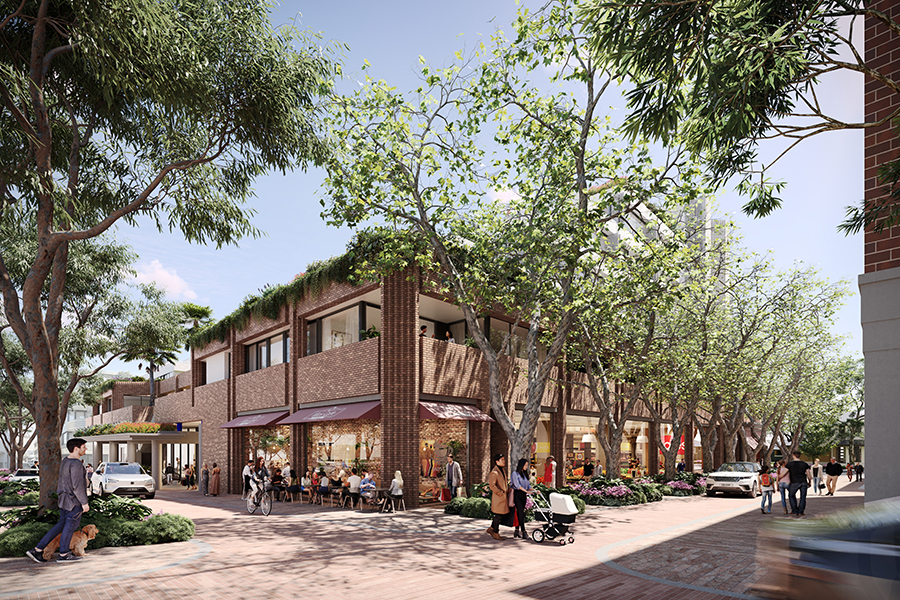It’s an extremely difficult task to bring myriad groups together to support a common cause. Our industry’s ‘Casual Mall Licensing Code of Practice’ was successfully re-authorised recently by the ACCC. It was the result of an industry working together; a great achievement by the SCCA.
Just before Christmas last year, the Australian Competition and Consumer Commission (ACCC) re-authorised our industry’s Casual Mall Licensing Code of Practice under the national competition and consumer law.
The retail industry has worked jointly and cooperatively on the Code over many years, and with great success.
With our colleagues at the National Retail Association (NRA), and with the support of the National Online Retailers Association (NORA), in July 2017 we made a joint application to the ACCC to re-authorise the Code, as the existing authorisation was due to expire on 31 December 2017.
The ACCC had previously authorised the Code in 2007, and again in 2013.
Our joint approach with the NRA reflected a willingness to be proactive and cooperative. It also demonstrated an ability to see the ‘big picture’. At its core, the Code’s continuation is about a focus on ‘new retail’, and continuing to embrace casual mall licensing, and other channels, as a mechanism for innovation, activation and customer engagement.
As NORA’s CEO, Paul Greenberg, has said in relation to casual mall licensing: “customers are increasingly demanding multi-touch points with their brands of choice’. In the evidence cited in our application, casual mall licensing is synonymous with the hugely popular concept of ‘pop-up’ retailing and, increasingly, the concepts of ‘retailtainment’, exclusivity, experience and personalisation.
Landlords describe casual mall licensing in terms of opportunities for ‘activation’, and are placing a greater emphasis on working to develop and profile ‘brand’. It continues to be leveraged to ‘incubate’ new retailers, including local providers and small businesses.
A quick walk-around at various centres speaks to this fact, whether it’s Tesla, Scrollies, or so-called ‘traditional’ retailers. In reaching out to consumers, the use of casual mall sites also extends to Government agencies, such as public transport operators and the Australian Tax Office.
In addition, as Vicinity Centres stated in their submission to the ACCC in support of the Code, “casual licensing is a key aspect of successful shopping centre operations’.
This point talks to the fact that casual mall licensing – along with other innovations, whether it be wifi or ticketless parking – is one aspect of ensuring the evolution and ongoing success of shopping centres.
I’ve had my members tell me that casual mall sites help drive customer foot traffic to a centre and bring in new customers, who, once there, go on to spend money in other stores.
At a time when there has been some poorly informed media commentary about declining foot traffic in shopping centres (it hasn’t, incidentally; we’ve just done a 10-year analysis on a stable sample of centres), even if this was the case, it would be great if such commentators acknowledged the role of casual mall activations in driving foot traffic.
In light of the above, the joint approach on this industry issue is a credit to the NRA CEO, Dominique Lamb (particularly in light of the NRA copping a shrill serve from another retail group which implied that, in working with cooperatively with us and in the interest of the sector as a whole, the NRA is somehow ‘landlord friendly’).
The re-authorisation process – which lasted several months – also reflected a productive approach with the ACCC, whose courteous and professional engagement is a positive reflection on Deputy Chair, Dr Michael Schaper, and his team.
A claim was similarly made by one group via media release that landlord representatives had to be dragged to the ‘adult’s table’ by the ACCC during the re-authorisation process.
This is, again, nothing but a high-pitched serve, and couldn’t be further from the truth.
Landlord representatives didn’t have to be dragged to any table, and nor did the ACCC have to do any dragging. To even suggest that the ACCC engaged in such conduct and behaviour undermines the positive efforts and engagement by their team.
In what often gets lost on some in the wider industry, for those shopping centre owners and managers that apply the Code, authorisation “provides protection from legal action for conduct that might otherwise breach the Competition and Consumer Act 2010’. This is the ACCC’s own words.
Without authorisation, “the Code would be at risk of breaching the Act because it includes agreements between competitors (shopping centre owners and managers) about leasing arrangements’. In what is essentially the key test for authorisation, the ACCC determined that the public benefit of such conduct is likely to “outweigh the minimal public detriment resulting from the Code’.
It became clear to us that some groups seemed to think that the Code is the mechanism that permits (and, therefore, could prohibit), casual mall licensing. This apparent misunderstanding was strange, considering that the Code has been in operation since 2007 and has been authorised twice before by the ACCC.
It’s fair to say that the process of re-authorisation was (pardon the pun) both competitive and contested.
It included representations, all of which are on the public record, from key Government stakeholders including the Small Business and Family Enterprise Ombudsman, Kate Carnell AO, and various state-based Commissioners.
It also included submissions from the Australian Retailers Association (ARA), the Pharmacy Guild of Australia (PGA) and Franchise Council of Australia (FCA), which resisted authorisation of the Code in the form proposed (which has not varied significantly in any operational sense since its inception in the mid-2000s).
These industry submissions raised generic issues, such as supposed unconscionability and coercion from landlords, through to specific provisions of the Code in relation to the treatment of adjacent lessees, line of sight issues and the definition of ‘competitor’.
We were afforded an opportunity to respond to all issues that were raised (which we did – in a comprehensive 20-page submission to the ACCC), and in applying the required tests, the ACCC ultimately determined to make no substantial changes to the Code in its re-authorisation.
During the consultation on the authorisation process, various media articles were prompted, including with bizarre headlines such as: ‘Pop-up parasites: the new rogues of retail’, ‘Pop ups hurting mall retailers’, and ‘Industry fight brews over pop-up store code’. (Again, I note that the Code was first authorised in 2007, and casual mall licensing is a ubiquitous component of shopping centre operations Australia wide, and have been for a long time. I’m sure you can understand why we were surprised by these articles.)
Core aspects of the Code remain in place, and set a framework for:
- Disclosure of relevant information to lessees in a shopping centre;
- The treatment of competitors relative to an adjacent lessee (i.e. a lessee in front of or immediately adjacent to the casual mall licence area);
- The adjustment of non-specific outgoings, including adjustment at the end of an accounting period;
- Dispute resolution; and
- The administration of the Code by industry stakeholders.
-
A key outcome that was proposed during the reauthorisation process was more engagement across the retail sector on the Code Administration Committee.
The Committee, which oversees the administration of the Code, is now proposed to include five retailer representatives and five landlord representatives (to be nominated by the Shopping Centre Council). We have also agreed, in principle, to the appointment of an independent chair to the Committee.
With the NRA, we have recently written to NORA, the PGA, FCA and ARA, inviting them to join the Committee and to nominate an appropriate representative.
In addition to Shopping Centre Council staff, landlord representatives on the Committee will be Greg Chubb, CEO of Retail at Charter Hall (and SCCA Director), Sheridan Joel, General Manager – Legal, at Scentre Group, and Michael Mackley, General Manager, Mall Space, at Vicinity Centres.
At the time of writing, the inaugural meeting of this freshly convened Committee is scheduled for the middle of March.
From an industry perspective, one of the strange things to come out of the ACCC’s authorisation was the ARA’s response, outlined in a published media release dated 20 December 2017.
Amidst its commentary were a couple of lines that are ripe for interpretation.
One that immediately jumps out is the ARA’s claim that they were “quite stunned to see the National Retail Association (NRA) abandon retailers in favour of their landlord friends at the Shopping Centre Council of Australia (SCCA)”.
The ARA went further: “It was astounding to see the NRA standing on the side of unfair competition and supporting the standover tactics of landlords when it comes to pop-up shops”. These statements are quite stunning, although sadly (from our perspective) quite predictable.
There’s the clear implication that by working with ourselves, the NRA has ‘abandoned retailers’ and are ‘landlord friendly’. One can’t help feeling this is a deliberate attempt to ‘stir the pot’, as if working with ‘landlords’ is inherently a bad thing.
Perhaps this is great fodder for certain people, but this is nothing but a swipe at the NRA. That’s all I’ll say.
We also take exception to the accusation by the ARA that landlords utilise ‘standover tactics’ when it comes to pop-up shops.
If you Google the term ‘standover tactics’, at least in my search results, the first three results feature: (1) a Wiktionary definition which refers to the use of ‘intimidation or threat of force to coerce others into submission or compliance’, (2) a media article about the use of standover tactics by an underworld figure, and (3) a media article about the use of standover tactics by bikie gangs in a ‘terrifying extortion racket’.
In other words, ‘standover tactics’ seem to have a clear association with improper, questionable and illegal behaviour.
The ARA’s accusation that landlords use ‘standover tactics’, therefore, has no place in a sensible debate about casual mall licensing. It is a shrill, hyperbolic swipe at landlords – full stop.
We haven’t levelled any similar or unprovoked criticism at retailers, or at retail industry representatives, even though we are living through a time where unsolicited commentary and views on the ‘future of retail’ is a dime a dozen. Instead, we, and the NRA, have focussed on working together for the betterment of the whole industry.
We were more encouraged by the FCA’s (chaired by former Federal Minister, Bruce Billson) public comments on the Code’s re-authorisation, which were more balanced and indicated they were looking forward to ‘engaging productively’ with us.
It is hoped all parties come to the new and wider-industry Committee committed to working collaboratively and positively with ourselves and the NRA.
The ACCC has handed down a balanced outcome amid an ever-changing retail market, where it should never be forgotten that the consumer is the ultimate driver of demand, and disruption.




















